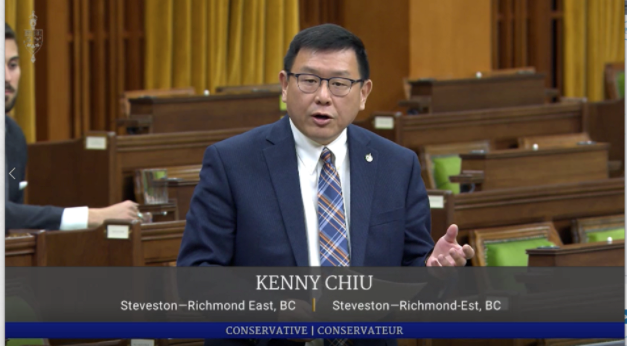For a politician who served only one term, he’s gotten a remarkable amount of media coverage.
In fact, Kenny Chiu, former MP for Richmond-Steveston, has probably been featured more in the national press since he was ousted from the House of Commons than when he was sitting.
The reason, of course, has to do with why he was ousted.
The Globe and Mail recently reported that leaked Canadian Security Intelligence Services (CSIS) documents reveal that the Chinese Communist Party (CCP) was intent on influencing the last federal election and used various tactics to discredit certain candidates who were critical of the regime and promote those they considered “friendly.”
Chiu fell firmly in the critical camp.
As a member of the Conservative Party, Chui voted to declare the treatment of the Uyghur people genocide and boycott the Beijing Winter Olympics — but Chiu went further than that. He also introduced a private members bill which sought to create a Foreign Influence Registry Act, which would require individuals acting on behalf of a foreign government to declare resources and activities regarding a public office holders and that registry would be made public.
Chiu, it appears, anticipated exactly what the CSIS documents claim — that there’s a well-heeled, carefully orchestrated system that funnels resources from the Chinese government through various individuals and agencies into Canadian politics.
Because of that bill, Chiu argued (and CSIS appears to have agreed) he became a particular target in the 2021 federal election. Of course, none of this is new. Even before the ballots were counted, Chiu was calling foul and accusing actors working on behalf of the CCP of creating a smear campaign on Chinese social media.
Chiu wasn’t the only one who noticed something strange was going on in the Richmond ridings where both Conservative seats flipped Liberal, despite the fact the vast majority of seats across the country stayed the same.
This was all reported at the time, but without the hard documents, the story only went so far. Now, it has hit the proverbial fan and people are calling for an inquiry. And I’m one of them, because we should remember that none of this has been proven in court, or at an inquiry. Without that, we’re left with a vague (or not so vague) sense of unease.
But it’s not just an inquiry we should think about. Racism is also rearing its head.
Some politicians who are thought to have benefited from the interference say the accusations will place the entire Chinese-Canadian community under public suspicion and make them targets for discrimination.
There may be some truth to that. Anti-Asian racism is a real thing, and some may paint a whole ethnic group with the same brush. However, calling racism can also be an attempt to stifle legitimate criticism.
In a press release sent out Tuesday morning, Victor Ho, former editor of the Sing Tao, states, “the CCP’s framing of well-founded scrutiny of the regime as racism is a tactic to stop the Western media...“
Just as racism is real, so is fear-mongering and obfuscation.
The other point this story highlights is the fact no political entity is too small. Some thought it a bit ridiculous to think little ol’ Richmond would be of interest to the big ol’ Chinese government, but an Australian intelligence expert said on CBC radio recently municipal politics is not immune.
We’ve done a number of stories about Iocal politicians attending CCP-supported events. I appreciate that it can be a tricky balance. A local politician wants to connect with all pockets of the community and attending a certain event or wearing a particular T-shirt doesn’t necessarily make you a stooge of any particular regime — at least it didn’t. Now, I’m not so sure.
Politicians need to know how to follow the money because there’s no excuse for not knowing whose colours they’re wearing.



